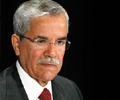In Oil & Companies News 07/11/2016

Former Saudi Oil Minister Ali al-Naimi broke his silence six months after his abrupt departure from his job, revealing more about his failure to forge an agreement to cut output at a 2014 OPEC meeting.
Mr. Naimi’s comments highlighted how difficult it will be for the Organization of the Petroleum Exporting Countries to finalize a production-cut deal later this month. The cartel agreed in September to pull back output by as much as 2% but left the details unspecified for implementing those changes.
Mr. Naimi, once considered a master of OPEC’s complex politics, said none of the cartel’s members were willing to cut production back in November 2014, when the group gathered as oil prices plunged on concerns about an oversupply of oil.
He said he asked all 11 oil ministers from OPEC countries individually about cutting production.
“All the answers were no. The expectation was: ‘Traditionally you—Saudi Arabia—cut.’ [I said] we won’t do that anymore, that’s it,” he told a packed auditorium of former OPEC grandees, delegates and analysts at the Chatham House think tank.
After the 2014 meeting, the oil price collapsed further, touching historic lows of below $27 a barrel by January of 2016. Oil prices have yet to return to $100 a barrel and are barely even trading at half that now. The price rout has sent shock waves throughout the oil industry, crushing profits at the world’s biggest oil companies, which have been forced to slash billions of dollars of spending and lay off hundreds of thousands of employees.
Mr. Naimi said he doesn’t regret his change in tactics in 2014, saying, “I think that still is the right decision.”
Mr. Naimi, who is promoting a new memoir, didn’t address his departure from the oil ministry in May after over 20 years as its leader. The change ushered in a new minister, Khalid al-Falih, who has taken a softer tone with OPEC and helped forge the production-cut deal in September.
The cartel is still struggling to hammer out a plan. Iran and Iraq have demanded exemptions from the cuts, deadlocking preparatory talks in Vienna last weekend. Iran wants to keep pumping until it reaches 4.2 million barrels a day, while Iraq says it needs to keep producing to generate revenues for an intensifying war against Islamic State.
The cartel has also struggled to get nations outside OPEC, such as Russia, the world’s largest oil producer, to commit to specific curbs. Russia—currently producing at record highs—has said it won’t even hold output steady unless OPEC provides detailed figures of its own cuts.
“I don’t know what’s going to happen now. I hope they [OPEC] agree,” Mr. Naimi said.
“The idea that OPEC can cut production to influence the market without all the producers working together is futile.”
Source: Wall Street Journal

